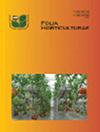探索天南星科植物种内花粉形态变异:园艺创新路线图
IF 1.8
4区 农林科学
Q2 HORTICULTURE
引用次数: 0
摘要
本研究旨在考察 18 种园艺芹属植物的花粉和花粉块形态结构。采用先进的光学显微镜和扫描电子显微镜(LM 和 SEM)来阐述和研究花粉和花粉块微形态的系统重要性。首先对花粉粒进行乙醇溶解,然后观察其雕刻特征。通过统计工具对量化数据进行树枝图聚类分析和主成分分析,以揭示花粉/花粉囊的形态类型。花粉大小不一,从 Cascabela thevetia 的 113.45 μm 到 Alstonia scholaris 的 23.4 μm。研究发现了四孢子、四孢子和三孢子晶粒。雕刻(外皮装饰)从网状穿孔到网状不等。观察到的花粉形状有狭长圆形、倒卵形、圆形和肾形。花粉块表面的网状梭形雕刻特征非常突出。根据检查结果,可以确定 Periploca aphylla 的最小外膜厚度为 4.9 μm,而 Cryptolepis dubia 的相应数字为 1.35 μm。根据花粉/花粉块特征分别构建了分类鉴定密钥,以鉴定芹属类群。在本研究中,共观察到七种花粉形状:从扁球形到近扁球形。研究结果证实,形态花粉特征在 Apocynaceous 属种之间存在差异。不过,这些特征可用于区分杓兰属类群。研究结果表明,花粉和花粉块的结构特征有助于准确地识别 Apocynaceous 物种。本文章由计算机程序翻译,如有差异,请以英文原文为准。
Exploring intraspecific pollen morphology variation in Apocynaceae: A roadmap for horticultural innovation
This study aimed to examine the pollen and pollinia morpho-structure of 18 horticultural Apocynaceous species. Advanced light and scanning electron microscopy (LM and SEM) were used to elaborate on and examine the systematic importance of pollen and pollinia micromorphology. Pollen grains were first acetolysed, which was followed by visualisation of their sculpturing features. The quantified data were subjected to statistical tools to elucidate dendrogram clustering and principal component analysis to reveal pollen/pollinia morphotypes. The size of pollen is variable, ranging from 113.45 μm in Cascabela thevetia to 23.4 μm in Alstonia scholaris. The study revealed tetrad, tetraporate, and tricolporate grains. Sculpturing (exine ornamentation) varies from reticulate perforate to reticulate. Pollinum shape was observed to be narrow oblong, obovate, orbicular, and reniform. Reticulate-psilate sculptural features were prominent among pollinia surfaces. Based on examination, it was ascertained that the minimum exine thickness in Periploca aphylla was 4.9 μm, whereas the corresponding number in Cryptolepis dubia was 1.35 μm. Taxonomic identification keys were constructed separately based on pollen/pollinia characters to identify the Apocynaceous taxa. In the presented study, seven pollen shapes were observed: from oblate to per prolate. The findings confirm that morphopollinic traits differ amongst genera of Apocynaceous species. However, these features can be used to distinguish the Apocynaceous taxa. The results show that structural characteristics of pollen and pollinia can help accurately identify Apocynaceous species.
求助全文
通过发布文献求助,成功后即可免费获取论文全文。
去求助
来源期刊

Folia Horticulturae
Agricultural and Biological Sciences-Horticulture
CiteScore
3.40
自引率
0.00%
发文量
13
审稿时长
16 weeks
期刊介绍:
Folia Horticulturae is an international, scientific journal published in English. It covers a broad research spectrum of aspects related to horticultural science that are of interest to a wide scientific community and have an impact on progress in both basic and applied research carried out with the use of horticultural crops and their products. The journal’s aim is to disseminate recent findings and serve as a forum for presenting views as well as for discussing important problems and prospects of modern horticulture, particularly in relation to sustainable production of high yield and quality of horticultural products, including their impact on human health.
 求助内容:
求助内容: 应助结果提醒方式:
应助结果提醒方式:


